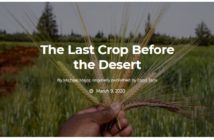3 magical healthy diet debutants (Thinkstock photos/Getty Images)
Every few months, a new berry, oil or seed promises to make us healthier, thinner, shinier. But does it really?
Every now and then, the food and beauty industry discovers a new player that makes it tremble with excitement. Sometimes it’s backed by research, sometimes it’s just a new, undiscovered element that a marketing genius stumbled upon and launched, to the delight of an enamoured audience of consumers. This search for the new, the ‘It’ ingredient is constantly on. But how many of these are actually good for you? What do the ones that are supposed to be good actually do? Who should be careful about overdosing on them? We took four items – quinoa, argan oil, edamame beans and agave – and put them under the scanner. Here’s everything you must know about them:
Quinoa
What is it?
It’s a seed widely used as a grain.
What are its health benefits?
According to nutritionist and counsellor Pooja Kothari, quinoa is a rich source of protein, fibre, calcium, phosphorous, iron and other essential minerals. It helps regulate blood pressure and blood sugar levels, relax muscle spasms, clear the intestines and keep the body toxin-free.
What else?
Nutritionist Tripti Bhandari recommends quinoa to those looking to lose weight, as it performs the function of a carbohydrate without adding the calories.
How should it be consumed?
Bhandari suggests cooking it as a brown rice replacement – in upma, dalia, pudding or kheer. To derive maximum benefit, Kothari suggests soaking it in water for seven to eight hours before you consume it.
Who should avoid it?
If you have gout or high uric acid, avoid quinoa.
Worth the hype?
Yes
Edamame
What is it?
Baby soy beans.
What are its health benefits?
It’s a rich source of dietary protein. “They contain a high amount of antioxidants and a low amount of oil with a little saturated fat, aiding hormonal balance and production of other essential enzymes,” Kothari says.
What else?
It is also a rich source of Vitamins B, K and E, and contains minerals such as calcium, iron, magnesium, copper and folic acid. It strengthens the immune system and in pregnant women, it’s good for the development of the foetus. It also reduces cholesterol, helps weight loss and has anti-inflammation properties.
How should it be consumed?
Kothari suggests you boil it till the pod becomes soft, and then add it to soup and salads, or simply eat it with some salt and spices. If you can coax an edamame sabzi out of it, go ahead!
Who should avoid it?
Same as quinoa, gout (high uric acid) and thyroid patients should avoid edamame, according to Bhandari.
Worth the hype?
Yes
Argan oil
What is it?
An oil extracted from a bush called Argan that grows in Morocco and some other parts of the world. On account of its rareness and exclusivity, it’s also very expensive.
What are its health benefits?
It has high concentrations of antioxidants, omega-6 and Vitamin E, which nourishes skin and hair.
What else?
It’s light and thus absorbed easily. It helps reduce acne, scarring, wrinkles and psoriasis. It can also be used in cooking and it reduces the risk of cardiovascular disease.
Worth the hype?
No. Dr Apoorva Shah of Richfeel says Argan oil’s health benefits are the same as those of any other hair oil. Shah’s advice is to oil your hair thrice a week, drink a glass of water every hour, and maintain a balanced diet to get the hair you desire.
mirrorfeedback@indiatimes.com
.






